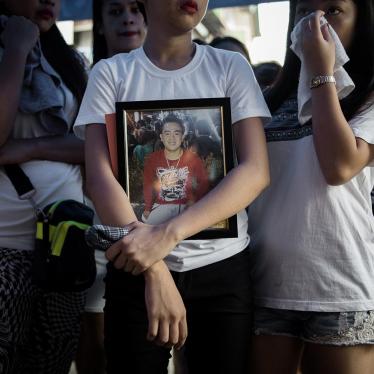(Paris) – French authorities are carrying out mass evictions and expulsions of Eastern European Roma in France, Human Rights Watch said today as it made public a briefing paper it sent to the European Commission in July.
The European Commission warned France a year ago to address its abusive policies or face possible sanctions in the EU Court of Justice. Despite the lack of real reform, the commission said in late August 2011, that it was satisfied with France’s response.
“The French expression, ‘The more things change, the more they stay the same,’ couldn’t be more apt,” said Judith Sunderland, senior Western Europe researcher at Human Rights Watch. “One year and a new immigration law later, Roma in France are still vulnerable to serial evictions, unfair expulsions, and discrimination.”
Human Rights Watch’s 19-page briefing paper details the way in which a new immigration law, enacted in June 2011, falls well short of complying with France’s obligations under EU freedom of movement rules and international human rights law. The paper also argues that there is ample evidence that France is unlawfully targeting Roma for camp evictions and expulsions.
Over the past year, thousands of Romanian and Bulgarian Roma have been ordered to leave France under procedures that violate their rights, Human Rights Watch said. The orders are frequently issued on a large scale in the days leading up to or during evictions from informal camps, without sufficient examination of the individual circumstances of the people there.
Those who receive such an order (in French an Obligation de quitter le territoire français, OQTF) must either appeal or leave the country within 30 days. If not, they are subject to detention and forcible removal. The courts have taken an inconsistent approach to appeals against the orders. In Lyon, for example, between October 2010 and April 2011, one chamber of the administrative court annulled 12 OQTF orders because there had been no individual assessment, while another chamber rejected 11 appeals against identical orders.
There are consistent reports of repetitive police visits to informal settlements, during which the police question all those present about the length of their stay in France and their livelihood. The police required camp residents, many of whom do not read French, to sign pieces of paper without telling them what they said, and without leaving them a copy.
Since mid-September, hundreds of Roma have been dislodged from informal settlements in Lyon in a concentrated wave of evictions. In the vast majority of cases, no alternative housing was offered. In one case, the police allegedly told a group of 80 to 100 Roma, including many children, who had been seeking new shelter for two days and nights following an eviction, to go to another informal camp. Camp expulsions have been carried out in other parts of France, including Marseilles and Paris. In late August, in the city of Saint-Denis, outside Paris, police evicted some 150 Romanian and Bulgarian Roma and escorted them by tram to a commuter railway station.
“The European Commission gave France the all-clear, but the situation for Roma in France has only grown worse,” Sunderland said, “It’s vital for the commission to renew its scrutiny of these abusive practices, which breach EU and human rights law.”
Some Roma leave France under the French Office for Immigration and Integration’s “voluntary assisted returns” program, under which adults receive 300 euros and children 100 euros to return to Romania or Bulgaria. Many do so only after receiving an order to leave the country, while there are reports from Roma rights activists that some Roma travel to France with the express purpose of receiving this aid. A chartered flight returned about 150 Roma from the Lyon area on September 20.
According to government figures, 4,714 Romanians and Bulgarians were expelled from France in the first three months of the year. Just over 9,500 were expelled in all of 2010. Roma rights organizations point out that the estimated number of Eastern European Roma in France has remained stable, at around 15,000, for several years.
The June immigration law targets Roma for expulsion, including for repeating short-term stays in France, begging and land occupation. High-ranking government ministers cited Romanian and Bulgarian citizens in particular, and Roma camps, when the measures were first proposed in August 2010. Claude Guéant, the current interior minister, announced in mid-September that a liaison officer from Romania would soon begin work in Paris to facilitate repatriation of Romanian children accused of a crime, though the legal basis for such returns remained unclear.
The law allows authorities to expel EU citizens for “abuse of rights” if they have been in France on repeat short-term stays or are in France “for the fundamental purpose” of benefiting from the social assistance system. This flies in the face of EU law, which allows citizens of member countries to stay in any EU country for up to three months without conditions. For long-term stays, people must be employed or self-employed, or have sufficient means to support themselves without becoming a burden on the host country’s welfare system.
Authorities around the country have long made it a practice to expel Roma on a mere presumption they might one day receive social benefits. Since June, Roma have been ordered to leave France for the simple reason they had been in France before, even though their current stay was under three months.
“These practices violate the law and the spirit of Europe’s rules of freedom of movement,” Sunderland said. “And you have to wonder whether it would be the same if Germans or Swedes for example were to be thrown out for visiting twice too.”
The new law requires authorities to conduct an individual assessment, taking into account the person’s age, health, economic, and family situation, as well as integration in France, before issuing an order to leave the country or ordering a forced removal on public security grounds.
But this important safeguard doesn’t include all of the necessary criteria, such as the impact of an expulsion on the economic, personal, and family life of the individual, and the hardships the spouse or partner and children risk in the country of origin, Human Rights Watch said.
There are concerns about lack of any genuine individual assessment. And the new law allows authorities to remove foreigners deemed to pose a threat to public order forcibly because they could possibly be prosecuted for begging and abusive occupation of land, for example, without explicitly requiring any individual assessment.
“This law was supposed to provide greater protection against unfair expulsions, but it may well make them more, rather than less, common,” Sunderland said. “Weak and spotty safeguards, measures targeting Roma – this is hardly an improvement.”
Despite deep flaws in the legislation and evidence of ongoing discrimination against Roma, the European Commission nonetheless issued a statement on August 25, indicating it was satisfied with the steps France has taken.
The European commissioner for fundamental rights, Viviane Reding, had threatened to take legal action against France a year ago, in the wake of a highly-publicized campaign to dismantle informal Roma settlements and expel Roma from Romania and Bulgaria.
At the time, Reding reacted forcefully to an administrative circular from the Interior Ministry, dated August 5, and leaked to the press in early September 2010, that ordered prefects to take “systematic action to dismantle illegal camps, priority given to those of Roma” and associated these measures with the “immediate expulsion of irregular foreigners.” In the wake of criticism, France adopted a new circular in September that removed the reference to Roma. In April 2011, the French Council of State ruled that the August 2010 circular had unlawfully discriminated against Roma.






